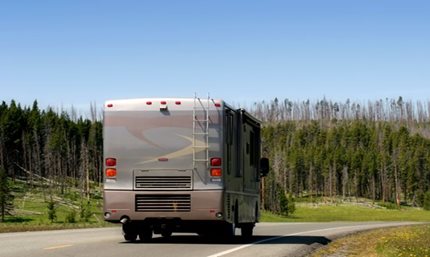News & Tips
SCCU’s Five-Minute Guide to Buying an RV

Q: This year, we’re thinking about doing something different and buying an RV, but RV lots seem so intimidating! What do we need to know to take some of the stress off?
A: Nothing is more American than a road trip, but long hours in the car can really suck the fun out of any vacation. That’s the beauty of recreational vehicles. The road IS the destination; anywhere you go, you’ll have luxury-class accommodations at your fingertips.
If you’re ready to buy an RV, this is a big financial decision. If your biggest assets are your car and your house, this RV represents a purchase that is somewhere between the two. There’s a lot to know before you set foot on a lot, and the more you research now, the better things will go.
With that in mind, here are four questions to ask yourself before you start shopping for an RV. With these as jumping-off points for research, you can make informed decisions about your needs. You’ll also be able to more clearly communicate what you’re after, which will make the buying experience more enjoyable.
1. What Class Type Am I Looking For?
Broadly speaking, there are three classes of RVs: Class A, Class B, and Class C, each offering benefits based upon your needs, desires, and budget.
Class A RVs: These are the biggest and most comfortable. Built on big rig platforms, these are basically rolling houses. They feature full-sized couches and TVs, full bathrooms, kitchens, and expandable bedrooms. Many also include storage underneath the vehicle (called the “basement” by enthusiasts) with enough space to stock supplies for a months-long journey.
They come with either gas or diesel engines, depending on your preference. Gas engines can provide more “oomph,” allowing for more acceleration and greater speeds. Plus, all other issues considered, they come at a lower price point than a diesel-powered one.
As far as maintenance, diesel engines typically need less, but when that’s needed, it can be more expensive and more difficult to DIY (do it yourself). As far as fuel efficiency, while diesel can get better mileage, the fuel comes at a higher price point.
Advantages of diesel RV engines: they last longer and can provide a quieter ride. They come with more torque, which is important when driving in hilly or mountainous areas. Plus, they typically have more resale value.
As one might expect for top-of-the-line vehicles, the price tags are as big as the vehicles, with average prices ranging anywhere from $100,000 to $600,000. Luxury Class A RVs can cost more than two million dollars for custom-built motorhomes. If you want to offset the cost of your investment, some people rent out their RVs, with prices between $750 and $2,000 weekly.
Class B RVs: These are on the other side of the spectrum. Unlike Class A RVs that can sleep six to ten people, Class B options are typically intended for two to four people. These are built on full-size van platforms. They can include scaled-down versions of the same amenities in Class A motorhomes, but in a more maneuverable, less costly package. They can also come in either gas-powered or diesel-powered engines. Expect to see a small kitchen, a compact bathroom, and enough sleeping space for 2-3 people for several weeks. The price tags on these vehicles typically run between $80,000 and $150,000.
Class C RVs: These are built upon a boxy pickup-truck chassis with a cab-over design that allows for sleeping space or storage. They’re typically shorter and more narrow with space at a premium. So you might, for example, have a sofa sleeper for bedtime. Advantages include how natural they can feel to drive, navigate, and park. Plus, there’s less room to heat or cool, and it can be easier to climb in and out of. A key advantage that causes many people to choose this type: you can go into your living space while someone else is driving the vehicle. Average prices can range from $70,000 to $140,000.
Each of these RV types—A, B, and C—are motorhomes. There are other options, of course. Camper trailers, also known as travel trailers, are lighter in weight, compact, towable, and more affordable. They don’t have independent engines. So, you can hitch one to your pickup truck or SUV and pull it behind your vehicle. When you arrive at your destination, you’ll have both your vehicle and your camper trailer. Inside the camper trailer, you’ll often have sleeping space, dinettes with seats, kitchenettes, and small bathrooms. Pricewise, you can get a basic camper trailer from $11,000 to $40,000. If you want to step it up, a mid-range one can cost $25,000 to $60,000. If you’d like a luxury experience in a travel trailer, expect to pay $50,000 to $100,000. You might also consider a pop-up trailer, which (as the name implies), is a cost-effective camping trailer that can fold up.
2. What’s My Budget?
Before you make a major purchase, you’ll want to be clear on how much you can afford. Given the significant cost of purchasing an RV, financing periods are usually 10 years or longer. Since the value of an RV depreciates over time, RV loan interest rates are slightly higher than home loan rates as well. It’s not just the monthly payment you need to include in your budget, either. You’ll also need to factor in fuel, insurance, registration, and maintenance—even if you don’t go anywhere!
Finally, it’s worth figuring out what you can budget for a down payment before you shop for your RV loan. You may be able to finance 100% of the purchase price of your RV, but putting money down helps protect you against depreciation. That means you’ll be able to get clear of your RV payment if you decide to sell it later on down the road.
3. When Should I Get Financing?
While many dealers will try to work out financing in-house, it’s never a bad idea to go in with a pre-approval instead. Not only will this allow you to negotiate from a position of confidence, but already being pre-approved for a loan will prove to the salespeople that you’re serious about buying. Getting pre-approved will also make sure you don’t fall in love with an RV you can’t afford. Nothing can ruin a fun vacation like a big bundle of “How are we going to pay for this?” stress! Learn more about RV financing in Florida here.
If you’re serious about purchasing, the time to talk about RV financing is now. How much RV you can afford should be at the forefront of your selection process, and getting your financing in order will help you figure that out. If you’d like to see what your vehicle of choice would cost you, use our convenient RV financing loan calculator to experiment with different price points, down payments, interest rates, and terms.
4. Choosing the Right RV for Your Needs
Once you’ve been pre-approved and know your budget, it’s time to go RV shopping! Here are some items to consider:
- Envision what you’ll need today and what you might need in the future (children or grandchildren on the horizon?).
- How often would you use the RV?
- At what times of the year for how long?
- Where would you stay? In campgrounds intended for people with children with appropriate amenities, or in a more remote place as a getaway?
- Where will you store your RV when it’s not in use? If it’s in your driveway, will it cause any issues with HOA?
- Are there any specific license requirements to own the RV you’re looking for?
For cost-saving strategies, discover where you can park your RV for free. Once you start knowing more people who travel with RVs, you’ll gather more recommendations. Use GasBuddy to fill up at the cheapest places and keep your tires optimally inflated.
If you stay in one place for a while, you can save money (versus going from place to place more frequently). Get discount coupons for places you want to visit; here’s information about fee-free parks to tour in Florida.
Why Choose SCCU for Your RV Loan?
Space Coast Credit Union is the third-largest credit union in Florida, serving nearly 700,000 members with more than 60 branches and 24/7 Online and Mobile Banking. Membership is open to anyone who is a relative of a current member or who lives or works in any of these counties. Unlike banks, we’re a not-for-profit financial institution focused on serving our member-owners with affordable accounts and loans, with fewer fees and better interest rates. We offer fast approval decisions, low rates for new and used vehicles,49 flexible terms,51 no application fees, and more for our RV loans.






















